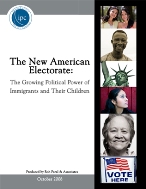IPC has compiled this one-stop analysis of all the available data on the Asian, Latino and New American vote and shows how and why they voted the way they did in the 2008 election cycle. The report features a variety of early, exit and election-day polling which tells the story of not only a record rate turnout, but also provides insight into the greatest areas of concern for these voters. It also explores early signals from the new administration and congress with respect to immigration reform.
The 2008 elections clearly demonstrated the growing power of the Latino, Asian, and immigrant vote. Not only did these groups turn out in record numbers, they also overwhelmingly rejected anti-immigrant politicians who attempted to use immigration as a wedge issue through hateful campaign rhetoric that is quickly becoming an unhealthy trademark of the Republican Party.
The following report illustrates the growing electoral clout of Latinos, Asians, and New Americans; provides data on how and why they voted; and demonstrates that immigration was an issue that motivated them to the polls. Election results from races in which immigration was a hot issue show that immigrant-bashing did not work as a campaign strategy. The report also provides evidence that a majority of all voters favor comprehensive immigration reform, and details early signs from the incoming administration and Congress that point to a new direction in immigration policy.
Politicians of all stripes would be wise to listen to the voices of ethnic and New American voters and not take them for granted. The analysis provided in the following pages points to the strength and growth of what may be the most important voting bloc in 21st century politics—one that now has the power profoundly to change American elections in the years to come.
Published On: Thu, Dec 04, 2008 | Download File




